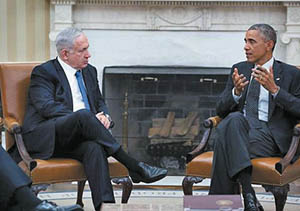
“If one would characterize the relationship [between Israel and the United States] over the last couple of years, it would be strain,” Dr. Bernard Firestone, dean of the College of Liberal Arts and Sciences at Hofstra University, said last week at a Yeshiva University panel discussion on the 2016 presidential election.
The panelists—Israel’s former ambassador to the U.S. and former deputy foreign minister Danny Ayalon, former U.S. ambassador to Egypt and Israel Daniel Kurtzer, and former deputy national security advisor to Prime Minister Benjamin Netanyahu Col. Eran Lerman—weighed in on the current status of the U.S.-Israel relationship, with a special focus on tensions between President Barack Obama and Netanyahu.
While the general consensus of the panel was that relations between Obama and Netanyahu are strained, “it is not unusual for countries that are ostensibly allies to have differences,” said Firestone, citing former presidents Ronald Reagan and George H.W. Bush as having labeled Israel as part of the “problematic political forces” that were opposed to a Mideast peace accord at the time.
Firestone said that despite these past differences, the U.S.-Israel relationship remained unshakeable because both countries share a strategic partnership. Israel was a “bulwark” for America during the Cold War and a “reliable ally” after it, he said.
“There are three elements which define the U.S.-Israel relationship. We are in dire need to make sure that these are maintained,” said Col. Lerman, listing the elements as similar values, similar interests (such as mutual geopolitical enemies), and a profound mutual understanding.
When asked about the Obama administration-brokered nuclear deal between Iran and world powers, Lerman said the agreement resulted in an unprecedented consensus between Saudi Arabia, Egypt, Jordan and Israel in their opposition to the accord. “The U.S will eventually have to shift their position in response to this reality,” Lerman said.
While in agreement with the previous panelists that the U.S.-Israel relationship remains strong, Kurtzer argued that certain developments give cause for concern. Amid the rise of the Boycott, Divestment and Sanctions (BDS) movement against Israel, a phenomenon Kurtzer called “overstated,” the former ambassador criticized the Israeli government for targeting leftist NGOs that are funded by the European Union while leaving right-wing NGOs alone, even though the right-wing NGOs may have also received foreign funding. “The language used by both leaders (Obama and Netanyahu) has not been healthy. We need to hold them accountable,” said Kurtzer.
The U.S. and Israel are expressing differences not due to a rift, but rather as a result of the strong bond between them, Ayalon said. The pro-Israel lobby is “the most democratic lobby” in American politics, according to Ayalon, explaining that the lobby does not impose policy and is very much a grassroots movement.
From the Israeli perspective, according to Ayalon, Obama made two moves that prompted the majority of Israelis to distrust him: He did not communicate confidence in Israel, and he looked to the Muslim Brotherhood as a legitimate partner.
When the panel was asked how best to deal with the perception that Obama is particularly critical of Israel, Lerman claimed that misperceptions are prevalent, especially with regard to Iran.
“Had Netanyahu delivered his March 3 speech to AIPAC and not Congress, it would not have been controversial,” Lerman said in reference to Netanyahu’s 2015 speech on the Iranian nuclear threat, an address that was criticized by the Obama administration because it was arranged without consulting the president. (Netanyahu did also address the AIPAC conference during the same U.S. trip.)
Kurtzer followed by describing the Netanyahu-Obama relationship as “toxic” and accusing current Israeli Ambassador to the U.S. Ron Dermer of acting “improperly” by inserting himself into American domestic politics.
“When a new president is elected and the Israeli prime minister retires, then progress can ensue,” said Kurtzer, who reiterated that differences of opinion among leaders do not necessarily entail a rift between nations. Rather, these are simply “misunderstandings” that have occurred throughout the history of U.S.-Israel relations.
Noting the short attention spans of global leaders, Ayalon said it is incumbent on supporters of Israel to remind others of the dangerous situation the Jewish state faces.
“We do not have any margin of error,” said Ayalon. “This is something that American leaders do not understand. Yet, we are the only American ally to never ask the U.S. to risk its own soldiers for our sake.”
By Bradley Martin/JNS.org
Bradley Martin is a fellow for the Haym Salomon Center and a research assistant for the Canadian Institute for Jewish Research.








